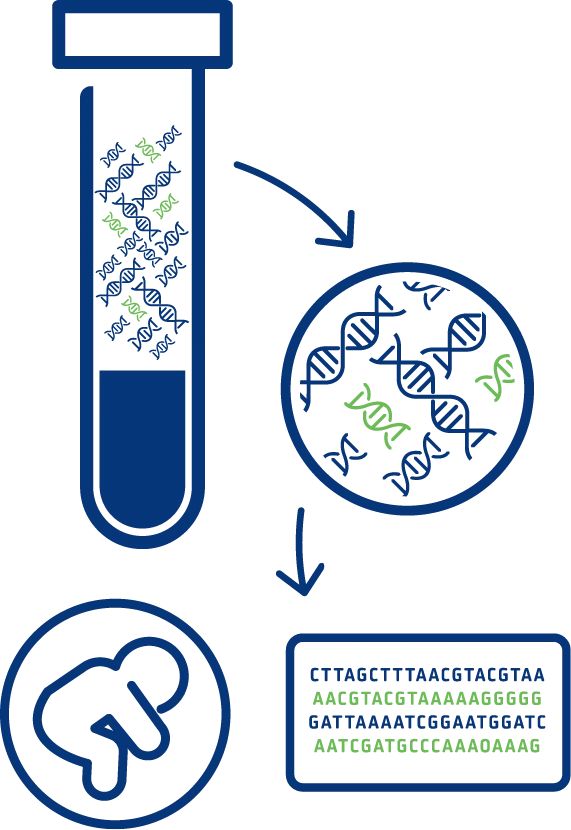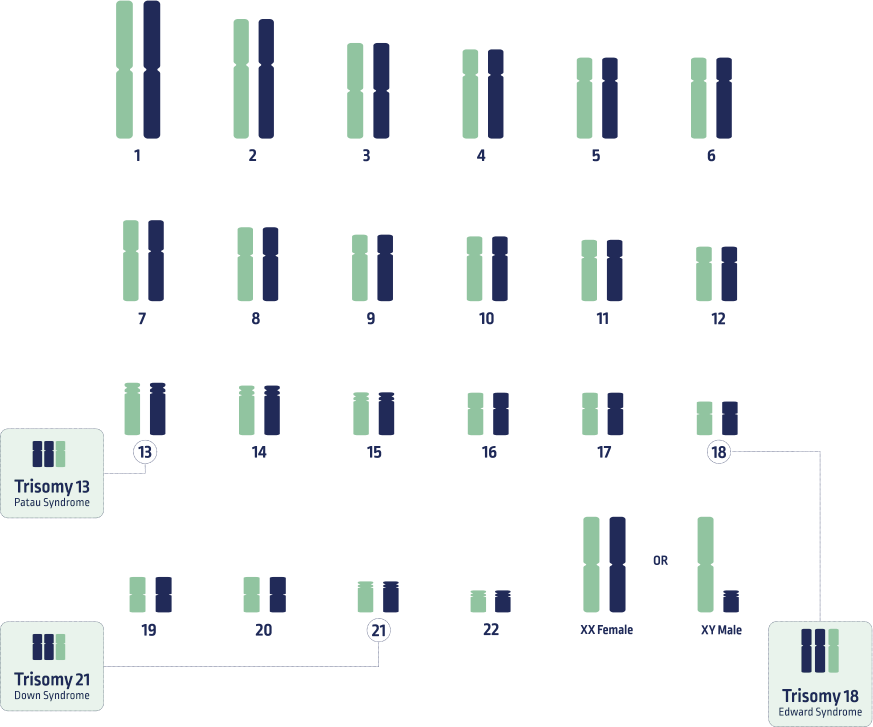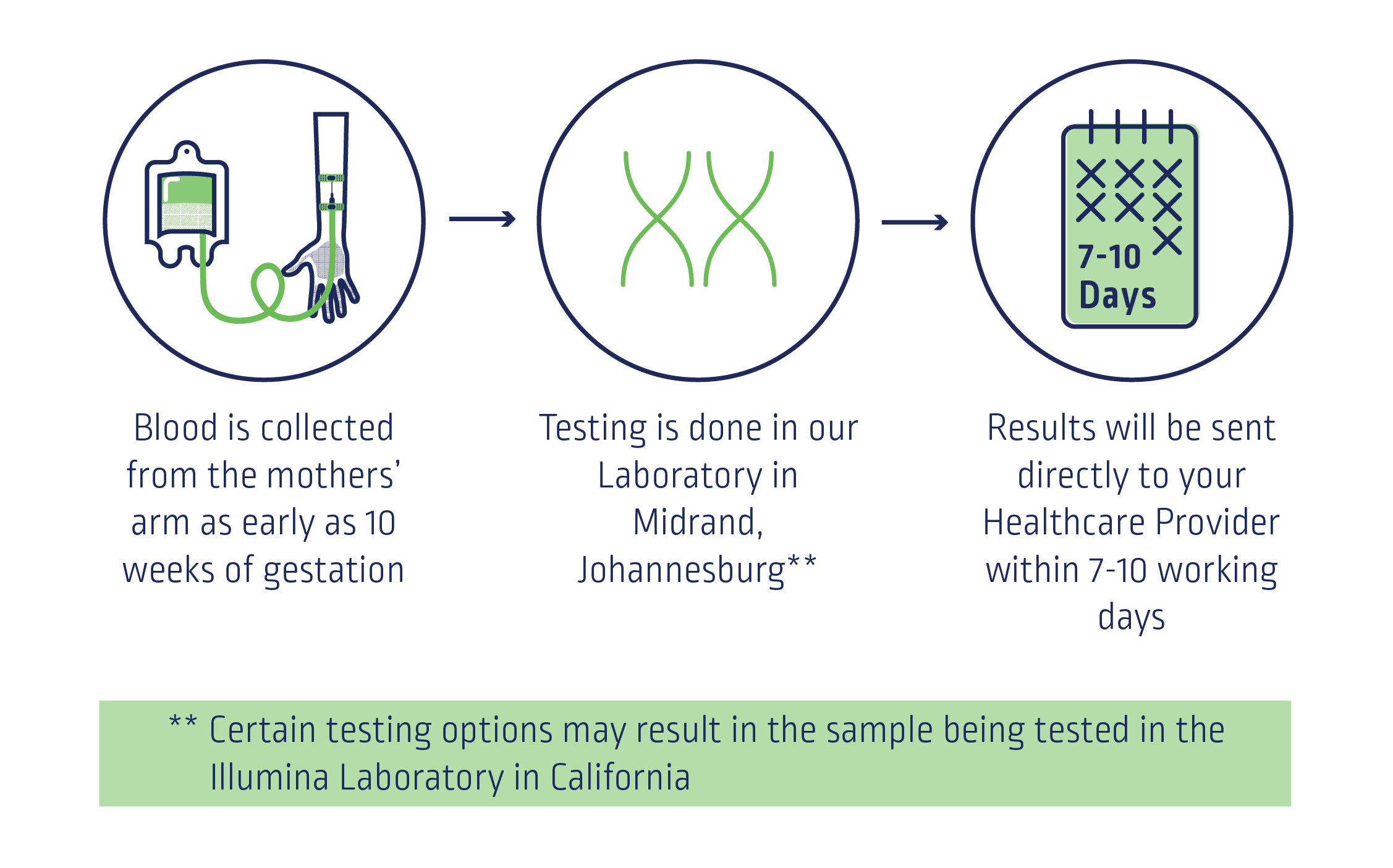- What is NIPT +
- What NIPT Screens for +
- Benefits of NIPT +
- Who can use NIPT +
- How NIPT works +
- Pricing +
- FAQ +
TriScreen (NIPT) safely and non-invasively screens for the most common chromosomal aneuploidies (abnormalities) from as early as 10 weeks gestation.
TriScreen NIPT uses a single maternal blood draw from the mother’s arm. It is more accurate than maternal blood tests and ultrasound in the detection of chromosomal aneuploidies, providing a greater sense of comfort.
What is a chromosomal abnormality?
Humans have 23 pairs of chromosomes (46 in total) within almost every cell in our body. One chromosome of each pair comes from our mother, and the other from our father. The first chromosome pairs are labelled 1-22. The last pair of these chromosomes are the sex chromosomes, which determine gender. Females usually have two X chromosomes, and males have an X and a Y chromosome.
A change in the number of chromosomes can lead to a change in development. Having an extra copy of a chromosome is called a trisomy (three copies), while missing a copy of a chromosome (having only one copy) is called a monosomy. A trisomy or monosomy can result in a genetic condition, such as Down syndrome. Individuals with Down syndrome have 3 copies of chromosome 21 (Trisomy 21).

Next Biosciences is proud to be a valued member of The Global NIPT consortium alongside other Illumina-powered laboratories.
TriScreen NIPT can screen for the following chromosomal abnormalities:
- Trisomy 21
Down syndrome
- Trisomy 18
Edwards syndrome
- Trisomy 13
Patau syndrome
- Sex chromosome abnormalities
Turner syndrome (monosomy X)Triple X syndrome (XXX)Jacobs syndrome (XYY)Klinefelter syndrome (XXY)

Additional NIPT Options
All chromosome testing – chromosomes 1-22, and X & Y can identify extra or missing pieces of chromosomes (segmental deletions and duplications >7Mb)
Microdeletions – chromosome 21, 18, 13 X&Y with 22q deletion only (Di George); 15q11 deletion (Angelman/Prader-Willi); 1p36 deletion; 4p- (Wolf-Hirschhorn); 5p- (Cri-du-chat)
*Additional blood draw arrangements and logistics are required.
Rhesus testing – chromosome 21, 18, 13 X&Y with the addition of fetal RhD status assessment
*Additional blood draw arrangements and logistics are required.
*It is recommended that all positive results are confirmed with a Chorionic Villus Sampling (CVS) or Amniocentesis to make a definitive diagnosis.
*Next Biosciences offers a free genetic counselling session with our in-house genetic counsellor for high risk NIPT results.
The benefits of NIPT include:
- Performed from as early as 10 weeks gestation
- Only requires a single blood draw from the mother's arm
- Non-invasive – no risk of miscarriage
- Affordable NIPT test with 3 and 6 month payment plan options
- Travelling nurse – blood draw in the convenience of your own home at no additional charge
- High detection rates for conditions tested
- Very low false positive rates and low false negative rates compared with traditional serum screening tests
- All patients who receive high-risk results following TriScreen NIPT are offered a free genetic counselling session to discuss the implications of the result and the available options in more detail

Disclaimer:
Non-invasive prenatal testing (NIPT) based on cell-free DNA analysis from maternal blood is a screening test; it is not diagnostic. Test results must not be used as the sole basis for diagnosis. Further confirmatory testing is necessary prior to making any irreversible pregnancy decision.
|
Screening of cell-free fetal DNA for common chromosomal conditions, |
||
|---|---|---|
|
Chromosome 21 (T21) |
R |
4 100 |
|
Chromosome 21, 18, 13, X&Y |
R |
5 950 |
|
All Chromosomes |
R |
6 500 |
|
Chromosome 21, 18, 13, X&Y & Microdeletions* |
R |
8 500 |
|
All Chromosome & Microdeletions* |
R |
10 500 |
|
|
||
|
Chromosome 21, 18, 13 X&Y, and Fetal RhD |
R |
6 500 |
|
Chromosome 21, 18, 13 X&Y, and 22q11 deletion (Di George) |
R |
6 500 |
*Please note that all prices include VAT and are subject to change.
How long will it take to get my results?
NIPT Results will take 2 weeks from the date of the blood draw provided that there are no additional delays in processing or account settling.
Will the results be sent to me directly?
No, your NIPT results will be sent directly to your referring healthcare provider. You will need to contact them directly for the results once released. An SMS and an email will be sent to you once your results have been released to your referring healthcare provider.
Is NIPT safe for me and my pregnancy?
Yes, it is a simple, non-invasive blood draw taken from your arm and is absolutely safe for both the mother and the baby.
Do I need to fast before my NIPT blood draw?
No, you do not need to fast before doing your blood draw.
How do I know if NIPT is right for me?
We suggest that you watch our NIPT 101 video to assist in deciding whether or not NIPT is right for you.
How is the TriScreen NIPT blood draw performed?
This simple test only requires a single blood draw from your arm, and can be done from as early as 10 weeks of pregnancy.
How early in my pregnancy can I get the blood draw done?
The NIPT blood draw can be performed from as early as 10 weeks gestational age.
Where can I get my blood draw done?
We have a number of options for blood draw facilities in South Africa and our client services team is dedicated to making arrangements that are easy and convenient for you. We also offer a bespoke travelling nurse service in certain regions to allow for blood draws at your home or work address at no additional charge.
Can the TriScreen NIPT test pregnancies conceived via assisted reproductive technologies (ART)?
Yes, TriScreen NIPT can test pregnancies conceived via ART, such as IVF. TriScreen NIPT can also be done on singleton pregnancies, twin pregnancies, donor pregnancies, IVF pregnancies (from 8 weeks post-implantation) and surrogate pregnancies
Does the TriScreen NIPT require a cheek swab from the biological father?
No, apart from a blood sample from a pregnant mother, the TriScreen NIPT does not require any additional genetic information from any other person.
Does a low risk NIPT result mean my baby is healthy?
No test can guarantee that a baby will not have any medical issues. It does not test for all genetic and non-genetic problems that may be present in a baby. TriScreen NIPT is a screening tool to assist both you and your healthcare provider in your pregnancy journey. Genetic counselling before and after testing is recommended.
Will the TriScreen NIPT be covered by my medical aid?
Yes, certain medical aids do cover the cost of the NIPT. The following medical aids will cover the cost of the NIPT if certain entry criteria are met:
- Discovery
- Bankmed
- CAMAF
- Profmed
- Polmed
- Bestmed
Our client services team will gladly assist with any medical-aid related queries and authorisation applications for your NIPT.
Can I make an arrangement for payment if my medical aid does not cover the cost of the NIPT test?
Yes. We can offer patients paying privately a 3-month or a 6-month payment plan. Both payment plans will require a deposit and the difference will be paid via debit order for 2 or 5 months.
Next Biosciences
Ariane Avenue
International Business Gateway
Cnr. New Road and 6th Road
Midrand, South Africa
Office Hours
Monday - Thursday: 08h00 - 17h00
Friday: 08h00 - 16h00
